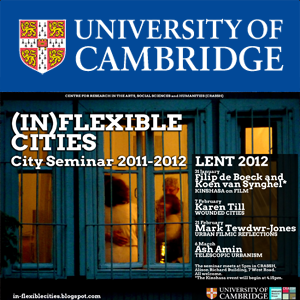City Seminar - 12 March 2013 - Urban Politics, Learning, and Inequality: Informal Sanitation in Mumbai
Duration: 56 mins 40 secs
Share this media item:
Embed this media item:
Embed this media item:
About this item

| Description: |
Dr Colin McFarlane (Reader in the Department of Geography, Durham University)
Abstract The global sanitation crisis is rapidly urbanising, but how is sanitation produced and sustained in informal settlements? While there is data available on aggregate statistics, relatively little is known about how sanitation is created, maintained, threatened and contested within informal settlements. Drawing on an ethnography of two very different informal settlements in Mumbai, this paper identifies key ways in which informal sanitation is produced, rendered vulnerable and politicised. In particular, four informal urban sanitation processes are examined: patronage, self-managed systems, solidarity and exclusion, and open defecation. The paper also considers the implications for a research agenda around informal urban sanitation, emphasising in particular the potential of a comparative ethnographic approach, and the possibilities for better sanitation conditions in Mumbai and beyond. |
|---|
| Created: | 2013-03-14 11:36 |
|---|---|
| Collection: | City Seminar |
| Publisher: | University of Cambridge |
| Copyright: | Glenn Jobson |
| Language: | eng (English) |
| Distribution: |
World
|
| Keywords: | CRASSH; City Seminar; Colin McFarlane; |
| Explicit content: | No |
| Abstract: | Dr Colin McFarlane (Reader in the Department of Geography, Durham University)
Abstract The global sanitation crisis is rapidly urbanising, but how is sanitation produced and sustained in informal settlements? While there is data available on aggregate statistics, relatively little is known about how sanitation is created, maintained, threatened and contested within informal settlements. Drawing on an ethnography of two very different informal settlements in Mumbai, this paper identifies key ways in which informal sanitation is produced, rendered vulnerable and politicised. In particular, four informal urban sanitation processes are examined: patronage, self-managed systems, solidarity and exclusion, and open defecation. The paper also considers the implications for a research agenda around informal urban sanitation, emphasising in particular the potential of a comparative ethnographic approach, and the possibilities for better sanitation conditions in Mumbai and beyond. |
|---|---|

